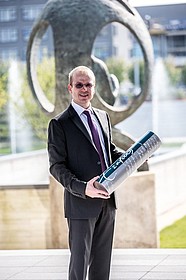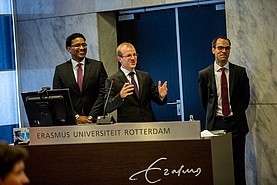PhD Defence: Managing Organizational Tensions - A Multi-Level Perspective on Exploration, Exploitation and Ambidexterity

In his new research, ‘Managing Organisational Tensions: A Multi-level Perspective on Exploration, Exploitation, and Ambidexterity’, Sebastian Fourné reveals that companies can successfully balance exploration and exploitation, and act with strategic agility, leveraging the experience of long-tenured employees and horizontal knowledge sharing across business units.
Firms must explore new avenues for value creation, re-invent themselves and most of all: innovate. Yet, dedication to traditional business models and rigid structures, procedures, and routines may undermine the pursuit of innovation. Moreover, organisational tensions arise as innovative activities shall not compromise the company’s efficiency and profitability.
Companies ought to be ambidextrous in managing tensions and trade-off between exploration and exploitation, but how can they effectively do so? With meta-analytic, survey research, and multiple case study research relying on interviews at Fortune 500 organisations, ERIM’s Sebastian Fourné helps practitioners identify and manage the tensions and trade-offs at the individual, unit, and organisational levels. With his dissertation, Sebastian contributes to the theoretical development of the exploration-exploitation framework and expands practical applicability.
At the individual level, it is important not to undervalue the more experienced employees with high organisational tenure. The longer employees work in an organisation, the more open and able to innovate they are. Long-tenured managers have a better network and can mobilise resources more easily; they are also more trusted and thus allowed to experiment within the organisation and to learn from failure. However, the benefits of long tenure only apply if companies have human resource management systems that promote job rotation and expose employees to different functions over time. For fresh ideas that drive innovation, there is no need to fire long-standing employees and hire externally. It is better to nurture talent within the organisation. Moreover, ambidextrous behaviours are particularly valuable at higher hierarchical levels.

At the unit level, the research shows that units often either go for drastic innovation or cutting costs – seldom both at the same time. Horizontal knowledge sharing of middle managers can help recognise and reverse these self-reinforcing patterns. However, pairing horizontal knowledge exchange with similar idea generating vertical activities with your boss harms middle managers’ effectiveness at driving both exploration and exploitation in balance within business units. Try to selectively engage laterally and vertically. In particular, middle managers should know what to discuss with and ask for from their boss – focusing on resource needs, legitimacy issues and autonomy for business unit activities.
Lastly, established and emerging market operations in parallel entail tensions between global integration and local differentiation quests. Strategic agility can be used to balance these forces. Sebastian Fourné provides insights into how to foster strategic agility by adopting modular organisational systems as well as high-performance human resource practices and by stimulating integrative thinking among multinationals’ most senior executives.
Sebastian defended his dissertation at Erasmus University Rotterdam on Thursday 18 September, 2014 in the Senaatszaal. His promoters were Professor Justin Jansen and Professor Slawomir Magala, and his supervisor was Dr Tom Mom. Other members of the Doctoral Committee included Professor Pursey Heugens and Professor Jan van den Ende, Professor Edward Zajac (RSM and Kellogg School of Management, Northwestern University), Professor Sebastian Raisch (University of Geneva) and Dr Quy Huy (INSEAD).
About Sebastian Fourné
Sebastian Peter Leonhard Fourné (1983, Germany) obtained his BSc International Business Administration degree cum laude at RSM in 2006. He completed an exchange at The Wharton School at the University of Pennsylvania when studying for his MSc in Strategic Management, which he also obtained cum laude at RSM. Sebastian’s research, which he conducted at RSM and INSEAD (Singapore), takes a multi-method and multi-level approach to investigating drivers and dynamics of exploration, exploitation and ambidexterity. He draws on organisational learning and paradox theory to study organisational tensions that arise in a dual pursuit of innovation and efficiency. Sebastian’s research scrutinises how large global firms can balance exploration and exploitation, how to foster ambidextrous managerial behaviours and how to blend strategic commitment and global integration with local flexibility. His research also bridges upper echelons theory and research on middle managers to investigate socio-political dynamics between top and middle managers in building ambidextrous organisations by stimulating ambidexterity within business units. Sebastian's second stream of research focuses on global strategy, particularly multinational enterprises in emerging markets. Sebastian is also a prized reviewer of top journals and involved in company advisory projects in strategy formulation, implementation, and new business development. Prior to joining the RSM’s Department of Strategic Management & Entrepreneurship, he worked on global corporate finance and strategy projects for the world's leading diamond company, De Beers, in London.
Abstract of Managing Organizational Tensions: A Multi-Level Perspective on Exploration, Exploitation and Ambidexterity

This dissertation draws on organisational learning and paradox theory to develop fine-grained insights at the individual, unit, and organisational level that contribute to the theoretical development of the exploration-exploitation framework. The four studies included in this dissertation reveal the nature of the tensions emerging in pursuit of ambidexterity at different levels and examine based on quantitative and qualitative data how organisations and their members can manage these tensions effectively in order to foster ambidextrous behaviours, to balance exploration and exploitation, and to be strategic, yet agile across emerging and established markets.
First, using meta-analytic techniques, Sebastian Fourné assesses which and how contingency factors shape the association of exploration and exploitation and clarified how conceptual choices and study context influence the generalisability and interpretations of primary studies in ambidexterity research. Second, at the individual level, he uncovers and tests antecedents and outcomes of managers’ ambidextrous behaviours. This study indicates that tenure is a double-edge sword; organisational tenure increases managers’ ambidextrous behaviours while functional tenure undermines such behaviours. Managers’ ambidexterity is particularly valuable when work contexts are characterised by uncertainty and interdependence. Third, Sebastian Fourné puts forward a multi-actor model investigating middle managers’ personal interactions with their peers in other business units and top managers in relation to unit ambidexterity. This study uncovers complementarities and trade-offs among middle managers’ horizontal and vertical interpersonal processes. Fourth, at the organisational level, Sebastian Fourné delves into the foundations and drivers of strategic agility and into how the inherent tensions can be managed in a multi-market context.
Photos: Chris Gorzeman / Capital Images


